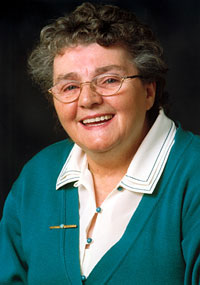17 December 2009 Edition
The Mary Nelis Column

The spirit of MacBride
TWENTY years ago, the late Oliver Kearney who was the secretary of the Fair Employment Trust, wrote a letter to Sean Farren, the then SDLP spokesperson on Employment who was about to embark to the United States, to lobby against the MacBride Principles, pointing out that if this was the case it was a disturbing development for a party claiming to represent the Northern nationalist community.
Farren was just one of a number of influential people from the North, including Church leaders, school principles, politicians and business personnel whose agenda was to prevent the MacBride Principles of Equality and Fair Employment from being adopted by the various state legislatures in the US.
It is 25 years since the world renowned statesperson and Nobel Peace prize winner the late Sean MacBride, conceived a programme of equal opportunity and affirmative action which became known as the MacBride Principles. The co-sponsors and signatories of the principles were Dr John Robb, Inez McCormack, and the late Fr. Brian Brady. Each had a distinguished history in the promotion of human rights and social justice. Through their efforts and those of the Fair Employment Trust, set up later with the declared aim of promoting the principles, the ravages caused by the British/Unionist policy of economic discrimination against the nationalist population of the Six Counties since partition was exposed internationally.
The greatest impact of the MacBride Principles apart from exposing the inadequacies of the Fair Employment Agency and the ineffectiveness of British legislation, was then and continues to be in the United States. Many US companies operating in the North of Ireland adopted the Principles and declared they would not invest or co-operate with firms in the North who did not adhere to anti-discrimination guidelines.
One would have expected that those who screamed the loudest about violence in the North would have seized the opportunity to engage with this programme of non-violent action as a means of addressing such endemic and pervasive injustice.
Instead the economically dispossessed in the North of Ireland, were left to ponder the spectacle of many middle class Nationalists including politicians, for reasons of personal gain, enroll as paid agents of the British Government to campaign against MacBride.
Senior members of the SDLP including John Hume lobbied privately against the principles in the US. In a widely circulated interview with ‘The Boston Globe’, Hume defended the British Government and accused the MacBride supporters of promoting disinvestment in the North.
It would prove to be a fatal misjudgment by the SDLP to the response by US legislators and American Public opinion to a very moderate and non-violent exercise in promoting affirmative action and social justice.
Inez McCormack speaking last week in the US, stated that the Mac Bride principles are as relevant today as they were 25 years ago. She said that the principles would enable the most disadvantaged communities to use the equality tools built into the Good Friday Agreement for resources to be allocated on the basis of objective need. That was and still is the spirit of MacBride.


